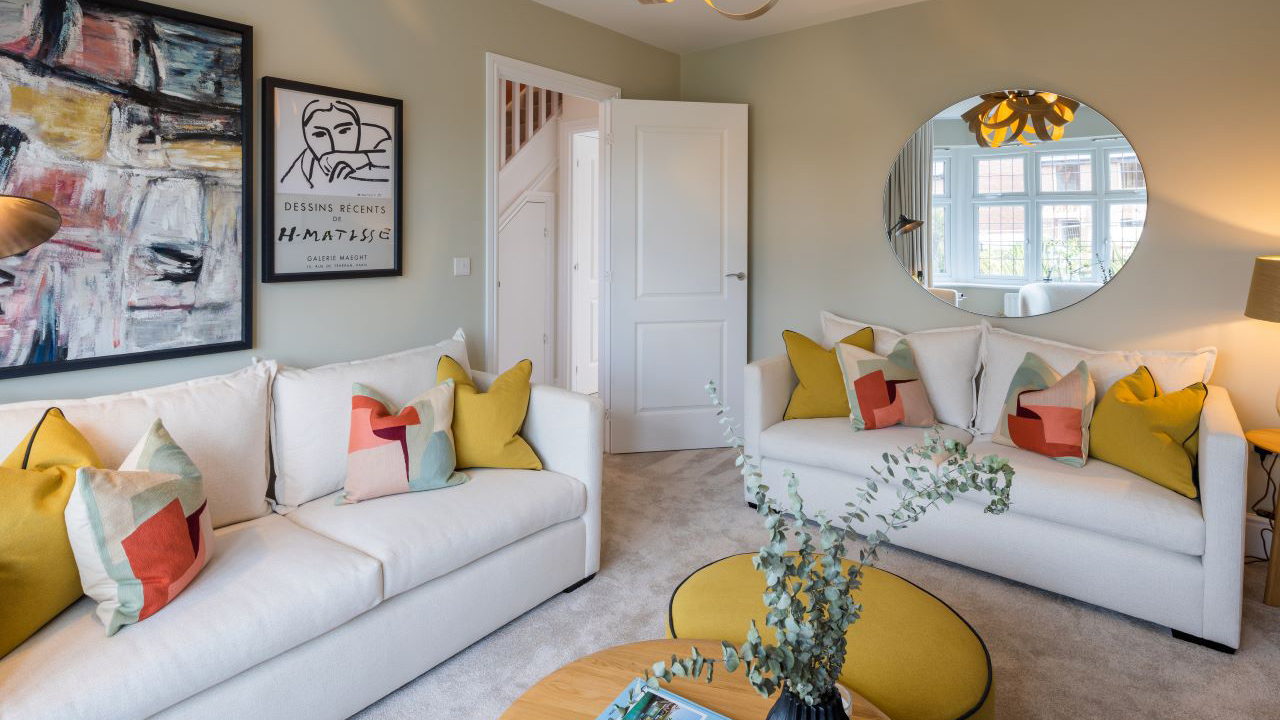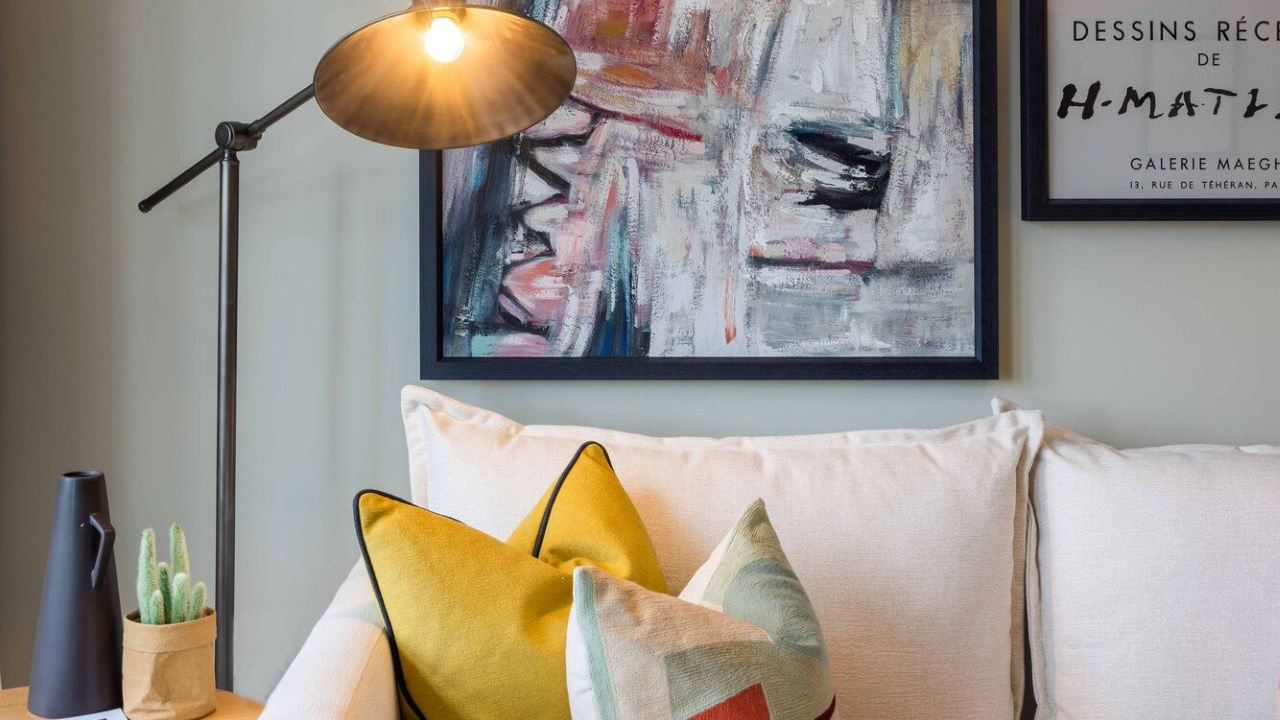
What is Feng Shui?
Thought to have originated around 4,000 years ago, feng shui translates to ‘wind’ and ‘water’. Drawing on astronomy and geometry as well as the Taoist religion, Far Eastern communities sought to harmonise themselves with their environment, constructing their homes, palaces and tombs near fast flowing rivers to harness the positive energy of the earth.
It wasn’t until the 1970s that feng shui gained wide popularity in the West, where it became associated with the layout of buildings rather than where they were situated.

But can you really put yourself in tune with nature, and become healthier and calmer, just by changing your interior design? According to enthusiasts, the answer is ‘yes’ – provided you follow some basic principles.
What brings positive energy into the house?
When it comes to creating a mindful and peaceful home there are three steps to help encourage positive energy:
Step one: Declutter
The first, and perhaps easiest, step to is to clear any clutter. According to experts, piles of clothes, old newspapers and toys, plus visible tangles of cords and wires don’t merely make a room look untidy: they can cause stagnant energy, triggering feelings of powerlessness and even depression.
A regular declutter, putting items back in their correct places and freeing up space can give you a sense of empowerment and control.
Pay particular attention to your front door and hallway entrance, which represent wealth and opportunity. Both should be in flawless condition, with the door clean or freshly painted, and the hall free of coats and shoes, but with a mirror and freshly cut flowers to brighten the space and lift the mood.
Step two: Reorganise using an energy map
Next, reorganise your interior according to the Bagua, the octagonal ‘energy map’ that you can lay over a floor plan of a single room or entire house to create balance.
The different sections of the Bagua relate to every aspect of life. These include wealth and prosperity; fame and reputation; relationships; family; health; children and creativity; knowledge and self-cultivation; career; travel and helpful people.
Using the Bagua map along with a compass you can see where the individual categories are located within your home (‘career’, for example, is traditionally in the north of a property, whilst ‘wealth and prosperity’ is in the south-east).
Step three: Consider colours and elements
Each of the Bagua sections correspond to particular colours and one of the five elements in Chinese philosophy: fire, earth, water, metal or wood.
According to practitioners, you should not only declutter it to boost the energy flow, you should also paint it in the corresponding colour – for example white for children - and consider introducing lamps made from the associated element, metal.
Feng Shui tips for bedrooms
For those who practice feng shui each room has a so-called ‘command position’, which is usually facing the door, but not directly in line.
The ‘command position’ is considered especially important in the bedroom, where you are potentially at your most vulnerable.
By adopting it you will enjoy a sense of security, which in turn promotes a deep and restful sleep.
Tip one: Position your bed carefully
Ideally, you should place the bed diagonal to the entrance. However, if that’s not possible due to lack of space, think about placing a piece of furniture between the two. It is also recommended to leave space on either side of the bed.
Tip two: Add a headboard and move mirrors
Practitioners advise fitting your bed with a headboard, preferably soft-edged and made of fabric, positioned against a solid wall for support. As for mirrors, they’re thought to deplete personal energy as you sleep, so avoid hanging or placing them opposite the bed.
Tip three: Double up
Pairs are believed to promote loving, harmonious energy in Feng Shui so practitioners advise you to double up on many items. So, even if you live alone, think about kitting out the room for two, with pairs of pillows, nightstands and bedside lamps.
Tip four: Choose colour wisely
When it comes to decorating your feng shui bedroom, consult the Bagua map to see exactly where in the house it is located. If it’s in the zone associated with health and wellbeing, consider the corresponding colour of yellow. If it’s linked with ‘relationships’, white or pink would be better choices.
Four Feng Shui living room ideas
As the living room is often the largest in the house, it’s the ideal place to try to create balance with the five elements of fire, water, earth, metal and wood. However, depending on where it’s situated in the property, you may want to emphasise one more heavily.
Idea one: Take inspiration from Bagua
Again, by overlapping the Bagua energy map, you’ll be able see which of the nine areas corresponds to the location of the living room. If, for example it’s in the ‘wealth’ area, which is associated with wood, you should bring in a range of house plants.

As well as introducing life and vitality, purifying the air and adding splashes of colour, they could – according to some – help boost your earning potential!
Similarly, if the room is in the ‘career’ zone of the Bagua map, you should think about emphasising the water element, maybe with a miniature fountain.
Idea two: Consider command position
When it comes to deciding which piece of furniture should occupy the ‘command position’, many opt for the sofa. That means it should face the door to the room, providing those who sit on it with a clear view of everyone who enters.
If possible, position the sofa a few centimetres away from the wall, to generate a feeling of added space.
To add to that sense, hang wall mirrors opposite the windows, especially if they’re able to reflect an attractive view.
Idea three: Use wall art to uplift
When considering wall art, choose paintings or photos that are uplifting and serene, as images associated with sadness bring negative energy forces.
Likewise, hanging the pieces too low can bring down the mood of a room, so experts advise placing them a few centimetres higher than you usually would to draw the eyes upwards.
Idea four: Declutter and refresh
As the living room can be the most used area of the house, with regular gatherings of family and friends, it’s often the most cluttered. To maximise the energy flow, make sure to clear away old, used and unwanted items regularly.
For an added boost, open the windows to introduce a blast of fresh air for 10 minutes each day.
Sustainable interior design
Staying in tune with the earth’s elements extends beyond Feng Shui principles. At Redrow, we’re increasingly looking towards natural and mineral textures in our show homes to boost the feeling of comfort and flow from outside to in.

A Redrow team member explains: “We’re adopting a forward-thinking approach to our sustainable interior design schemes, to meet increasing demand from environmentally conscious homeowners.
“In our recent Oxford show home at Kensington Gate, we’ve trialled a range of sustainable design materials, while taking inspiration from another design trend, Japandi, which is a fusion of Japanese and Scandinavian design. This has helped us to develop a home in which the main focus is simplicity and functionality, with a strong connection to nature.
“There are wonderful echoes of natural woods repeating throughout each room, along with gorgeous greenery to infuse them with a fresh and natural feel; while maintaining on-trend styling from mixed metallic touches and a range of organic textures.”
Buying a new home from Redrow means you can personalise many areas of your interior design before you move in. Visit a development near you to find out more.


